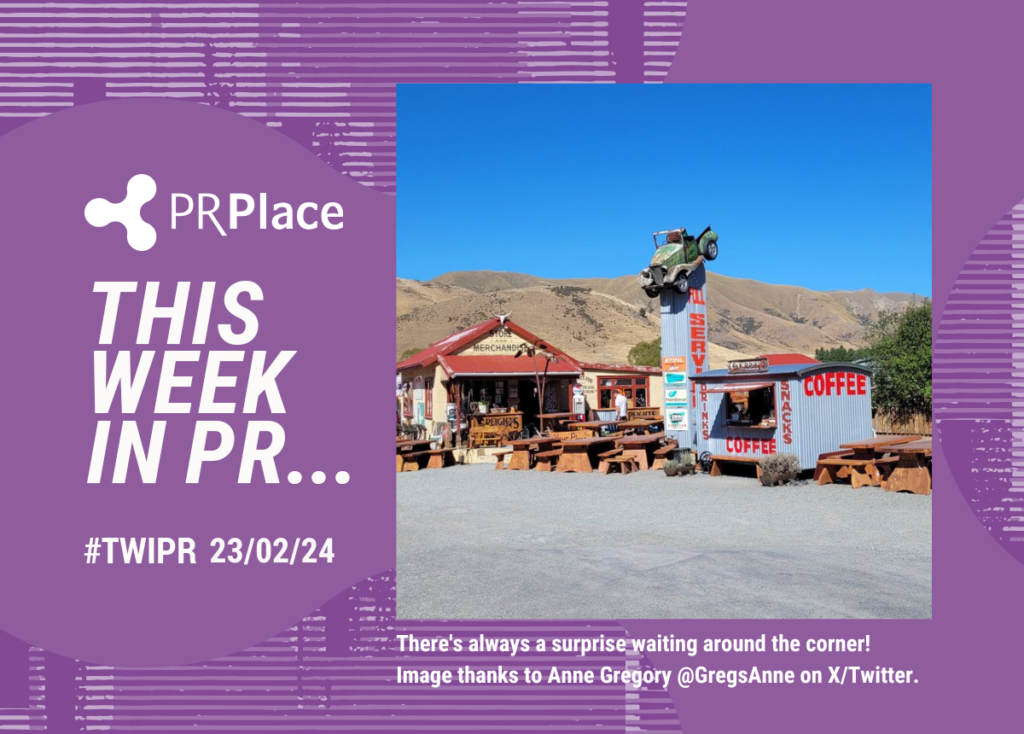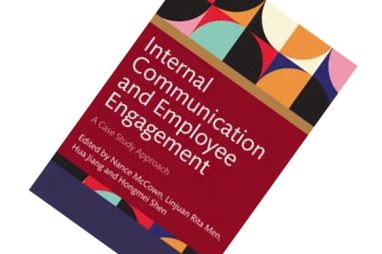This week in PR (23 February)

About the author
Richard Bailey Hon FCIPR is editor of PR Academy's PR Place Insights. He teaches and assesses undergraduate, postgraduate and professional students.

Profession and ethics
- Ben Smith: Did anyone read the ethics code? A discussion about PR ethics with Mary-Beth West and Trevor Morris [podcast] (22 February)
‘AI is a hot topic right now – but it’s not dealt with in these 24 international ethics codes. Only two of the 24 provided for whistleblower protection.’ - Curzon PR: PR’s Battle for Truth in 2024 Global Elections (19 February)
‘First, PR and Communication professionals must acknowledge the changed landscape. All too often, we play according to the old rules, assuming our messaging will still resonate and cut through as it did in the past. Secondly, we must stand at the forefront of promoting media literacy.’
Business and finance
- Alastair McCapra: Could The Recent NatWest Headlines Have Been Avoided with Better Communications? (17 February)
‘Foreseeing potential crises and acting to reduce their probability and impact is what senior public relations professionals do. Public relations is often seen as the eyes and ears of an organisation. Reputational risk management demands that ability to focus on the perspectives of stakeholders, whether internal or external. By elevating this external view to the highest levels of governance, organisations are better placed to consider reputational risk strategically alongside other critical factors.’
Purpose and ESG
SUSTAINABILITY COMMUNICATION DIPLOMA
Consulting, skills and careers
- Jessica Pardoe: 4 Things I’ve Learned From My First Networking Events (22 February)
‘Whether it’s a conference (BrightonSEO is my all-time favourite, but I really hope to do some more this year), an in-person course or training day, an expo, a show, or a good old-fashioned networking event, you’ll probably be surprised at how good you feel after doing it.’ - Charlotte Stoel: From potato to progress: Addressing communication breakdowns (22 February)
‘I will never forget delivering training on ‘active listening’ to a team member, who then said, “this is a bit basic”. Yes, it is basic, but active listening is actually harder than you think. You may believe you’re doing it by listening, staying quiet, nodding your head and maybe even repeating back what you heard. But have you done it with self-awareness and empathy, making sure to pick up on other subtle cues to ensure the speaker feels truly listened to?’ - Liam FitzPatrick: A book I wish I’d seen earlier – a lot earlier (22 February)
‘The Communications Advisor addresses two questions which I, and so many comms professionals, ask – ‘what is a trusted advisor’ and ‘what does it take to become one’?’ - Ben Capper: I survived 5.5 years as a “freelancer”. here’s what I (and fellow freelancers) learned along the way… (19 February)
‘My job has changed a bit in five years. I now rarely call myself a “freelancer” anymore. I’ve been through the mindset shift to be an owner of a comms consultancy, that I also happen to be the lead consultant of. I talk in terms of “we” rather than “I” a lot more than I used to, as I do have a brilliant team of regular associates working on projects now, that I didn’t have at the beginning.’
Gender, diversity, health and wellbeing
- Lulu Price: Navigating consumer health trends: Insights from leading health journalists (22 February)
‘During a recent media panel event hosted by MHP’s Health team, we explored the transformation of healthcare with the rise of self-care, and the implications for consumers and the media.’ - Terri McCollin: Protecting the brand: Avoiding diversity washing in marketing communications (19 February)
‘Are the DEI initiatives implemented by companies three years ago showing results? Are they following through on their reissued value statements? Do their equality-supporting brand campaigns reflect sentiment among minority and LGBTQ+ employees? Have they taken steps to confirm this? If the answer to any of these is no, they are effectively indulging in diversity washing.’
Politics, public affairs and public sphere
- Emma Rae: Navigating the Media in an Election Year (22 February)
‘Although we live in an ever-evolving social sphere, the power of traditional media remains, driving public conversation and painting perceptions of those at the top of party politics.’
- Stuart Thomson: Should You Challenge A Politician: Weighing The Pros and Cons (21 February)
‘The very ongoing public spat between Harry Staunton, the former Post Office chair, and Kemi Badenoch, Secretary of State for Business and Trade, continues to dominate headlines. Taking on a politician is a complex decision that carries both risks and potential benefits.’
- Drew Aspinwall: Did Rishi have a plan for the future of British Food? (20 February)
‘Today Rishi Sunak was the first Prime Minister to attend the NFU National Conference since Gordon Brown addressed the conference 16 years ago.’
- Gabriel Milland and others: Portland poll shows European discontent leading to far-right surge (16 February)
‘Citizens across Europe are profoundly unhappy about issues such as the cost of living, with inflation still hitting the continent, and immigration, the unresolved problem of the bloc. They are planning to punish the parties of the centre, centre-right and centre-left – and prioritise national issues over European ones.’
Brands, content, community and creativity
- Jon Clements: How thought leadership delivers genuine business results (22 February)
‘[INSEAD] research showed that businesses with one per cent more LinkedIn followers have 0.5 per cent more revenue on average – therefore making a link between opinion leadership and business performance.’
Research, data, measurement and evaluation
- Stella Bayles with Gary Preston: CoverageImpact. Will it solve the PR Industry’s number 1 problem? [podcast] (no date)
‘CoverageImpact is a free tool to help people visualise the impact of their coverage. Let’s start a conversation about it and get people using it. It’s going to be a lot of fun to try.’
Crisis, risk and reputation
Internal communication
INTERNAL COMMUNICATION DIPLOMA
- Stuart Rhys Thomas: Communication-related words people hate (22 February)
‘Words are to communication what salt is to cooking. They add flavour… But add too much, and everything is spoilt!’ - Katie Macaulay with Agatha Juma: The stories that shape us [podcast] (21 February)
‘Those who do not have power over the story that dominates their life, power to retell it, rethink it, deconstruct it, joke about it, and change it as time changes, are truly powerless because they cannot think new thoughts.’ This is by Salman Rushdie, the author. I love it.’
Media, digital and technology
- Tom Flynn: Google Gemini (20 February)
‘As with Open AI’s Chat-GPT Pro, Gemini Advanced is a paid-for service that offers more features and capabilities than the free offer available to all users.‘ - Matt Redley: A new ‘reality’: OpenAI’s new text-to-video tool delights and terrifies (20 February)
‘This announcement has stunned the AI community. In less than a year, OpenAI has created a tool that experts have said is two or three years ahead of where capabilities of text-to-video generative AI were assumed to be.’


